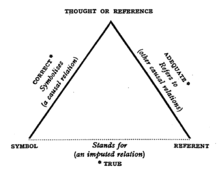Pragmatics/History/1920s
Before 1600s 1700s 1800s 1900s 1910s 1920s 1930s 1940s 1950s 1960s 1970s 1980s 1990s 2000s 2010s |
1920s
[edit | edit source]1921 Russell
[edit | edit source]- Russell, Bertrand (1921). The Analysis of Mind. London: George Allen & Unwin. [^]
1921 Sapir
[edit | edit source]1922 Wittgenstein
[edit | edit source]- Wittgenstein, Ludwig (1922). Tractatus Logico-Philosophicus. Frank P. Ramsey & C. K. Ogden, trans., Kegan Paul, 1922. [^]
1923 Malinowski
[edit | edit source]- Malinowski, Bronislaw (1923). "The Problem of Meaning in Primitive Languages." Supplement to: Ogden & Richards (1923), pp. 296-336. [^]
1923 Ogden and Richards
[edit | edit source]- Ogden, C. K. & I. A. Richards (1923). The Meaning of Meaning: A Study of the Influence of Language upon Thought and of the Science of Symbolism. London: Routledge & Kegan Paul Ltd. [^]

| THOUGHT relates ∧ | ||
| SYMBOL | to | REFERENT |
| or | ||
| refers SUBJECT to ∧ | ||
| PROJECT | OBJECT | |
The root of the trouble will be traced to the superstition that words are in some way parts of things or always imply things corresponding to them, historical instances of this still potent instinctive belief being given from many sources. The fundamental and most prolific fallacy is, in other words, that the base of the triangle ... is filled in. (p. 14-5)
In other words, the symbol is not the symbolized, in short, so as to be aligned with "The map is not the territory" (1933/Korzybski) and the like.
"The influence of language upon thought" (as in the subtitle) varies from man to man, perhaps furthermore from case to case, as Locke suggested. Then, dehumanization would be more or less unwise. No precise or wise symbolism without symbolists. Pragmatics is a must above all.
1923 Wells
[edit | edit source]- Wells, H. G. (1923). Men Like Gods. Cassell and Co., Ltd. [^]
1926 Piaget
[edit | edit source]1926 Russell
[edit | edit source]- Russell, Bertrand (1926). "The Meaning of Meaning." Dial, vol.81 (August 1926) pp. 114-121. [^]
1927 Wells
[edit | edit source]- Wells, H. G. (1927). The Way the World is Going: Guesses and Forcasts of the Years Ahead. London: Ernest Benn Ltd., 1928. [^]
1928 Wells
[edit | edit source]- Wells, H. G. (1928). The Open Conspiracy: Blue Prints For A World Revolution. Doubleday, Doran. [^]
1929 Magritte
[edit | edit source]- Magritte, René (1929). The Treachery of Images (La trahison des images). Los Angeles County Museum of Art, Los Angeles, California. [^]
"This is not a pipe," as translated from the original French caption, is to say that the image is not the imaged.
